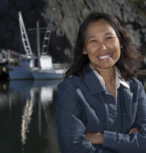DNA reveals the past and future of coral reefs
New DNA techniques are being used to understand how coral reacted to the end of the last ice age in order to better predict how they will cope with current changes to the climate. James Cook Univer

From 2005 to 2022, the main node of the ARC Centre of Excellence for Coral Reef Studies was headquartered at James Cook University in Townsville, Queensland (Australia)








Abstract:
Around the world, small-scale fisheries are the dominating sector in terms of number of people involved and contribution to local food security and sustainable livelihoods. Yet, information and knowledge about small-scale fisheries is still incomplete, making it difficult for the sector to realize its potentials. With the current concern about overexploitation and unsustainable development of fisheries and marine resources, and about the overall health of the aquatic ecosystems, greater attention is required to enhance our understanding about small-scale fisheries, where solutions to some of the problems may be found. It is also imperative that policies and management decisions are made to promote the viability of this important sector and to reduce their vulnerability. From the research perspective, this means thinking innovatively about how best to draw on multiple academic disciplines, as well as the knowledge of fisheries people and practitioners, in the examination of issues and in the articulation of both the problems and the solutions. Drawing from the experiences of the global network Too Big To Ignore, this presentation highlights key challenges associated with small-scale fisheries research and governance and offers suggestions about ways forward.
Biography:
Ratana Chuenpagdee is Professor at Department of Geography, Memorial University, Canada. From 2006-2016, she served as the Canada Research Chair on Natural Resources Sustainability and Community Development. As an interdisciplinary scientist interested in resource governance, she has conducted research in many countries, including Cambodia, Canada, Malawi, Mexico, Spain and Thailand. Ratana is currently leading a global research partnership, Too Big To Ignore, which aims at elevating the profile of small-scale fisheries and rectifying their marginalization in national and international policies. As part of this project, she’s coordinating research and activities to enhance understanding about small-scale fisheries, to improve governance, and to support the implementation of the Small-Scale Fisheries Guidelines around the world. Together with colleagues, Ratana has several publications on small-scale fisheries, including the two recent editorial volumes Interactive Governance for Small-Scale Fisheries: Global Reflections (2015) and The Small-Scale Fisheries Guidelines: Global Implementation (2017).
New DNA techniques are being used to understand how coral reacted to the end of the last ice age in order to better predict how they will cope with current changes to the climate. James Cook Univer
A new study on the effects of climate change in five tropical countries has found fisheries are in more trouble than agriculture, and poor people are in the most danger. Distinguished Profess
James Cook University researchers have found brightly coloured fish are becoming increasingly rare as coral declines, with the phenomenon likely to get worse in the future. Christopher Hemingson, a
Researchers working with stakeholders in the Great Barrier Reef region have come up with ideas on how groups responsible for looking after the reef can operate more effectively when the next bleaching
Abstract: As marine species adapt to climate change, their heat tolerance will likely be under strong selection. Individual variation in heat tolerance and its heritability underpin the potential fo
Abstract: The Reef Ecology Lab in KAUST’s Red Sea Research Center explores many aspects of movement ecology of marine organisms, ranging from adult migrations to intergenerational larval dispersal
Abstract: Macroalgal meadows are a prominent, yet often maligned component of the tropical seascape. Our work at Ningaloo reef in WA demonstrate that canopy forming macroalgae provide habitat for ad
Abstract: Sharks are generally perceived as strong and fearsome animals. With fossils dating back at least 420 million years, sharks are not only majestic top predators but they also outlived dinosa
Abstract: Connectivity plays a vital role in many ecosystems through its effects on fundamental ecological and evolutionary processes. Its consequences for populations and metapopulations have been
Abstract: Evolution of many eukaryotic organisms is affected by interactions with microbes. Microbial symbioses can ultimately reflect host’s diet, habitat range, and even body shape. However, how
Abstract: The past few years have seen unprecedented coral bleaching and mortality on the Great Barrier Reef (GBR) but the consequences of this on biodiversity are not yet known. This talk will expl